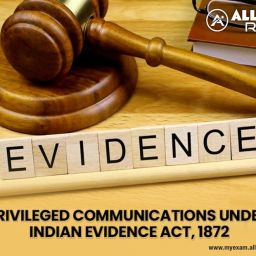The Post Highlights Key Legal Principles Related to The Dishonour of Cheques Under Section 138 of the Negotiable Instruments Act, 1881
The Negotiable Instruments Act, 1881 (N.I. Act) in India has a historical background. It was initially drafted in 1866 by the 3rd Indian Law Commission and presented in December 1867 in the Council. Subsequently, it went through several revisions and was referred to a Selection Committee.
The final draft, prepared for the fourth time, was introduced in the Council and eventually enacted into law in 1881 as the Negotiable Instruments Act, 1881 (Act No. 26 of 1881). The Act governs the law relating to negotiable instruments, such as promissory notes, bills of exchange, and cheques, providing a legal framework for their use and regulation in commercial transactions.
A “cheque” as per Section 6 of N.I. Act, 1881 is a bill of exchange drawn on a specified banker and not expressed to be payable otherwise than on demand and it includes the electronic image of a truncated cheque and a cheque in electronic form.”
Cheques Are Defined by the Following Characteristics, Emphasizing that
- it must be drawn on a specified banker,
- payable on demand,
- and can include electronic forms of cheques.
The Banking, Public Financial Institutions and Negotiable Instruments Laws (Amendment) Act, 1988,
introduced significant changes to the Negotiable Instruments Act. The most notable change was the insertion of Section 138, which made the dishonor of a cheque for insufficiency of funds or if it exceeds the amount arranged to be paid by the drawer’s account a criminal offense.
This criminal remedy was aimed at providing a more effective deterrent against the issuance of cheques without sufficient funds and at the same time offering a quicker and more punitive measure to deal with defaulters.
The introduction of criminal liability, along with civil remedies, aimed to ensure promptitude and remedy against defaulters, contributing to the credibility of holders of negotiable instruments and fostering a more secure environment for financial transactions.
This amendment was a significant step in addressing the lacunae in the legal framework related to dishonour of cheques.
Section 138 specifically deals with the dishonour of a cheque for insufficiency of funds or if it exceeds the amount arranged to be paid by the drawer’s account. To summarize, the key elements for an offence under Section 138 are as follows:
- Drawing of the cheque: The cheque must be drawn by the drawer.
- Presentation of the cheque to the bank: The cheque must be presented to the bank within a reasonable time of its issue.
- Return of the cheque unpaid by the drawee bank: The cheque should be dishonoured by the drawee bank due to reasons such as “insufficient funds” or if “it exceeds the amount arranged to be paid.”
- Issuance of notice in writing to the drawer: The payee must, within 30 days of the receipt of information by the bank regarding the dishonour, give notice in writing to the drawer of the cheque, demanding payment of the cheque amount.
- Failure of the drawer to make payment: The drawer has 15 days from the receipt of the notice to make the payment. If the drawer fails to make the payment within this period, it constitutes an offence under Section 138.
As per Section 142 of the Negotiable Instruments Act, 1881, the complaint for an offence under Section 138 (relating to dishonour of a cheque) has to be filed within one month of the date on which the cause of action arises. The cause of action arises when the drawer fails to make the payment within 15 days of receiving the notice as required under Section 138.
So, the timeline for filing a complaint is relatively short, and it’s essential for the aggrieved party to initiate the legal process promptly if the drawer fails to make the necessary payment within the stipulated time after receiving the notice.
CASE LAWS PERTAINING TO SECTION 138, NI ACT, 1881
In Modi Cements Limited v. Kuchil Nandi (1988) it was held by the Supreme Court that if a cheque is issued towards an existing debt or liability, the drawer cannot simply issue stop payment instructions to the bank as a means to avoid payment. Issuance of stop payment instructions does not absolve the drawer of their penal liability if the essential conditions under Section 138 are met.
In another matter of Kusum Ingots & Alloys Ltd. vs. Pennar Peterson Securities Ltd. (2000) held that for a dishonoured cheque to attract the provisions of Section 138 of the Negotiable Instruments Act (NI Act), it is essential that the cheque is issued for a legally enforceable debt or liability. If the cheque is issued as a gift or for a purpose that does not constitute a legally enforceable obligation, Section 138 may not apply.
Section 138 of NI Act will still be attracted if a person issues a post-dated cheque to settle a debt or other liability and then stops payment on the cheque before the date mentioned on the cheque, as was observed in the matter of Goaplast (P) Ltd. v. Shri Chico Ursula (2003).
Laxmi Dyechem vs. State of Gujarat (2012) However, your statement reflects a scenario where there is a mismatch of the signature on a cheque, and after notifying the drawer about the discrepancy, if the drawer fails to make arrangements, Section 138 of the Negotiable Instruments Act, 1881, is attracted.
Indus Airways Private Limited vs. Magnum Aviation Private Limited (2014) if a cheque is issued as an advance payment for the purchase of goods, and the purchase order is not carried to its logical conclusion due to cancellation or other reasons, and the material or goods are not supplied, the cheque may not be considered as drawn for an existing debt or liability.
The scope of Section 138 is not limited to cheques issued for discharge of existing debts or liabilities. Sripati Singh (D) vs. State of Jharkhand (2021) the Supreme Court Even observed that the cheques issued as security, if dishonoured, can give rise to criminal liability under Section 138, provided that the other conditions specified in the section are met.
For the most accurate and up-to-date information on these legal principles stay connected with us at ALLEN RJS.
Click Here to know more about ALLEN ACE RJS Courses.





